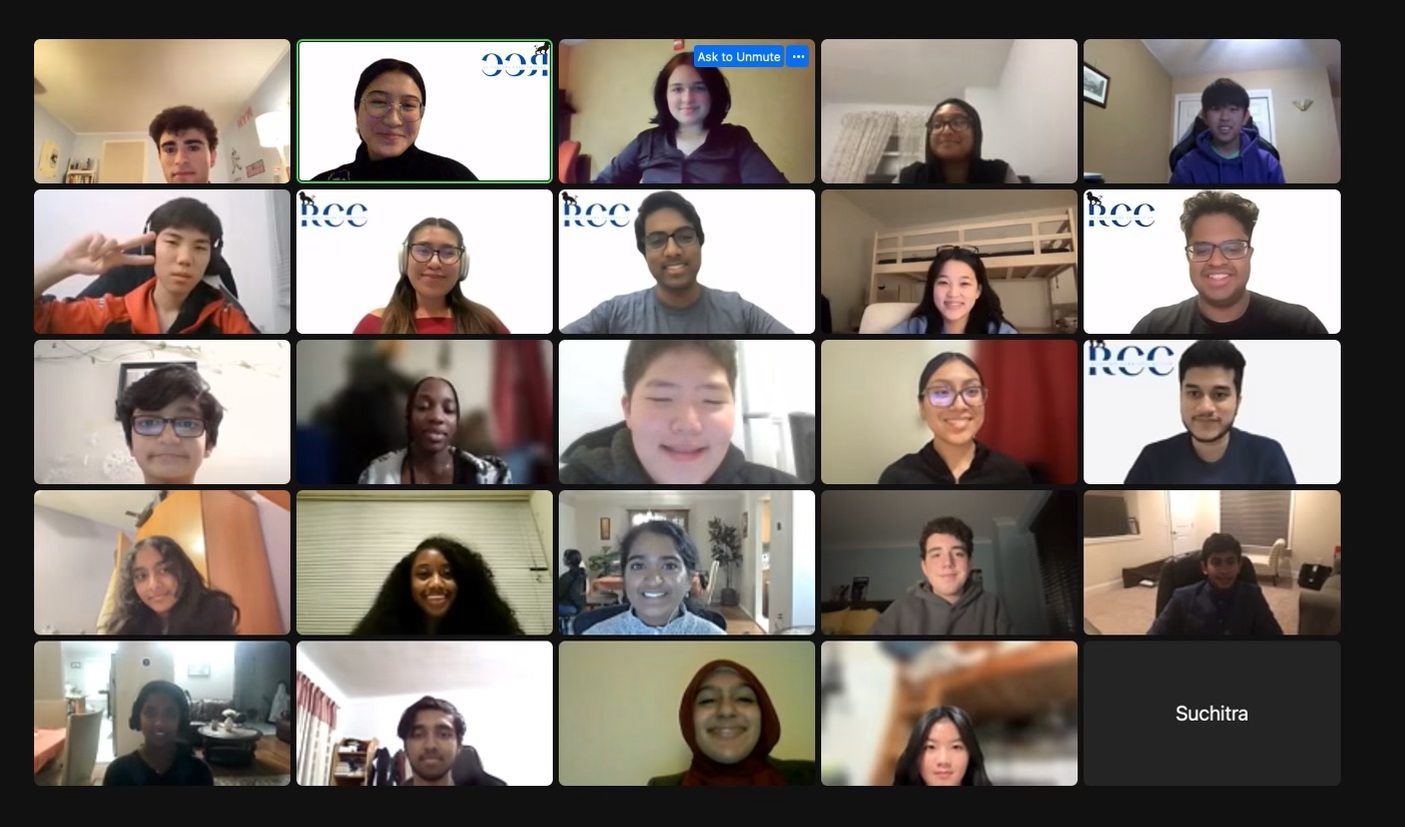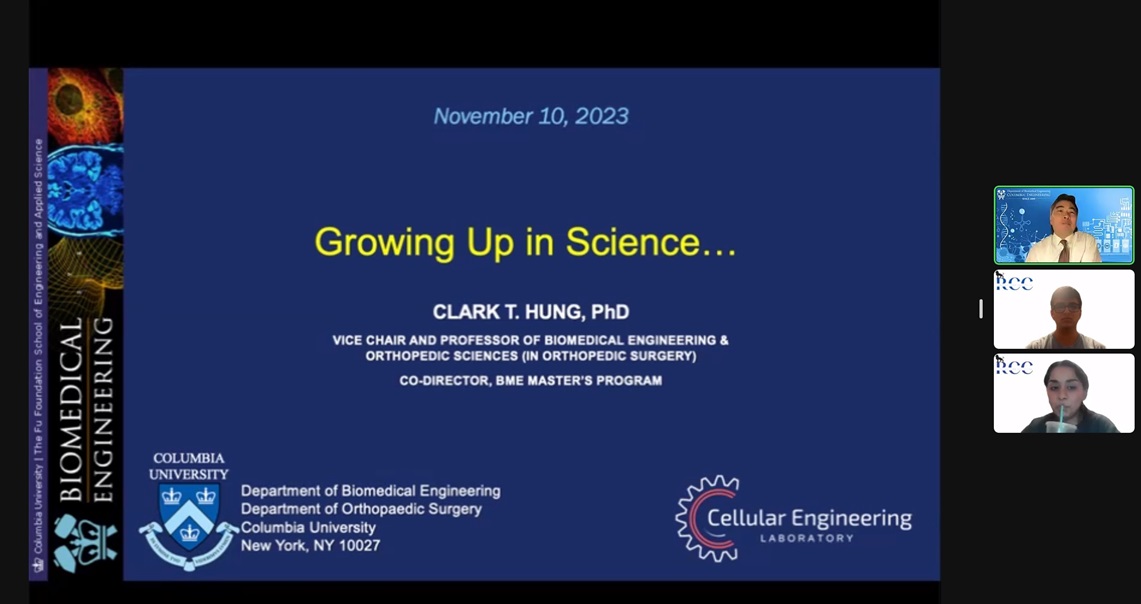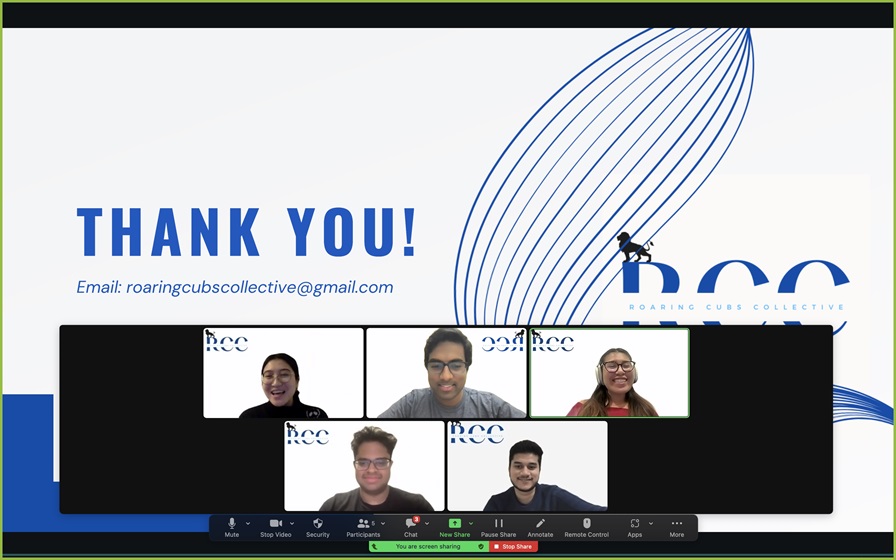
Roaring Cubs Collective Gives Students the Confidence to Venture Further into the World of Scientific Research
Roaring Cubs Collective (RCC) is the brainchild of two scientific researchers and research mentors who believed that more young people would choose to delve into scientific research were the right mechanisms in place. High school students with a bent toward the sciences need encouragement, mentorship, and experience in order to contemplate a career in research. The idea of RCC is to give students the confidence and the tools to identify and explore an area of interest with the help of knowledgeable mentors. Once this is accomplished, students can find the confidence to explore how they might begin to apply their newfound skills in practice, for instance by obtaining an internship in an academic laboratory.
Research, one might say is by nature, an uncertain business. That can make it a daunting prospect to choose research as a field of study and career, not to mention that adolescence is, altogether, a time of uncertainty that comes with feelings of insecurity. A budding scientist may wonder if they’ve really got what it takes to pursue a life of research, and may not have a clue where to begin. Bolstering the self-confidence of would-be researchers then, is an acute need in our technological world.
We believe that more students would choose the sciences were they to receive encouragement and supports such as those provided by the Roaring Cubs Collective. It is our hope then, that the modest assist from our small grants program to the RCC will encourage others to build on this work with similar initiatives. We put some questions to RCC Cofounders Pranay Talla and Karina Leung to learn more about this important endeavor:
Kars4Kids: Your flagship program is STEM Research Scholars Program (SRSP). Would you give us an overview of this program?
Pranay and Karina: Absolutely! SRSP provides 1-on-1 virtual mentorship for high school students and advanced middle school students (grades 6-12) on a personalized literature review research project on any scientific topic of choice. After being paired with a mentor, students spend 10 weeks meeting with their mentors and engaging with a rich curriculum consisting of seminars, workshops, guest lecturers, networking sessions, individual meetings, symposia, and more! Students engage with research questions of their choice, and are paired specifically with mentors who can develop their specific passions and grow their domain knowledge. SRSP teaches students how to read, write, analyze, synthesize, and present complex scientific topics; these skills form the bedrock of any successful career in the sciences and can be easily transferred to other academic and professional domains. To that end, we help students create concrete deliverables such as literature review papers that we publish on a semesterly basis and flash talks that are presented at our end-of-semester symposia. Following SRSP, students will be equipped to venture further into the world of scientific research with confidence. Several SRSP alumni have been able to use our program as a springboard into research internships at academic labs.

Kars4Kids: Roaring Cubs Collective says it is a “Free STEM research mentorship program by academic researchers.” Can you define “research mentorship” for us?
Pranay and Karina: We pair students with mentors who have conducted research in their particular fields of interest, so that students can receive personalized advice on their progress. We define successful “research mentorship” to consist of the following four key elements. First, a mentor must be able to provide high-level guidance on selecting and refining scientific questions; once a student is able to find a question that is both interesting and tractable to them, they will find the research process much more fulfilling. Second, mentors must be able to tap into their versatile understanding of any relevant basic scientific and/or mathematical concepts so that they can not only teach students specific subject material, but also how to develop learning strategies and identify key resources so that students can begin to grow independently. The key to independent learning is confidence; mentors have a third responsibility to strive to instill a sense of confidence and positivity in their students to combat imposter syndrome and feelings of being overwhelmed, which are unfortunately common initial responses to the open-ended nature and high barrier to entry of academic research. Finally, the fourth responsibility of a mentor is the facilitation of networking and a willingness to help students navigate the landscape of universities, labs, and other institutions that comprise the landscape of academia.
Kars4Kids: Can you describe the typical Roaring Cubs mentee? Who comes to you to take advantage of what you offer? What’s your demographic? Where are you located?
Pranay and Karina: We currently have four ongoing programs, each of which have a slightly different “typical mentee”. Our STEM Research Scholars Program (SRSP) attracts applications from 6th to 12th grade students from dozens of countries across the world; the typical SRSP mentee is a motivated high school student who enjoys learning about science but lacks the knowledge, resources, or connections to venture into academic research. Each SRSP cohort typically consists of students from Manhattan, students from elsewhere in the United States, and a few students from outside the United States. We began as a local organization in Manhattan and strive to continue serving students from the area, but were also very excited to expand our reach to the rest of the country and beyond. The typical student in our STEM Research Leadership Program (SRLP) is an SRSP alumni who is eager to both continue exploring research and to spread their experience and passions to their friends and peers in their local community. Our Working Groups Program is open to anyone, and welcomes highly motivated students who already have domain knowledge and computational skills and are ready to tackle original research. Finally, our Academic Advising Program is open to anyone and typically best serves senior high school students who need help with resumes, interviews, applications, and presentations pertaining to research fairs, science competitions, academic publishing, and other opportunities in higher education. Overall, we strive to make our programs as accessible and inviting as possible and highly encourage any student (with or without prior research experience) to apply!
Kars4Kids: Now that we know about the mentees, can you talk about the mentors? What qualifies someone as an “academic researcher” for your purposes?
Pranay and Karina: Academic researchers are students or professionals with a record of internships and/or full-time employment in research laboratories at universities; they typically have or are working towards a bachelor’s, master’s, or doctorate in the sciences, mathematics, engineering, or medicine. We invite academic researchers with mentorship and teaching experience to join us as mentors. In order to be able to fulfill our above definition of “research mentorship”, mentors must be intimately familiar with the landscape of their student’s field of interest and have a fundamental understanding of historical and contemporary advances in the field, prominent individuals in the field and their specific niches within the field, and the economic and societal factors that influence the trajectory of the field. More importantly, mentors must also be patient, compassionate, and inspiring. Our current group of mentors are all talented at communicating science and have a passion for volunteering their time to serve their communities and the next generation of STEM researchers.
Kars4Kids: You also offer advanced programs, three of them. Do the courses stand independent of each other? Or is it more of a three-pronged or tiered approach to the field of research?
Pranay and Karina: Yes, the STEM Research Leadership Program (SRLP), the Working Groups, and the Academic Advising program are completely independent from one another. Students may choose to pursue any and all of these programs that fit their individual interests and needs. These programs do address three different aspects of research education; SRLP focuses on developing students’ ability to implement their scientific experiences in the realms of community service and mentorship, growing their capacity for leadership and collaboration in the process. The Working Groups allow students to more deeply engage with a specific research question of interest over a long period of time, in order to obtain specialized domain knowledge and potentially uncover new, original findings. The Academic Advising program helps guide students along their journey of college and career readiness, as well as professional development as it relates to academic research and research-adjacent fields.

Kars4Kids: Tell us about you. What led you to start the Roaring Cubs Collective. What can you tell us about the two of you?
Pranay and Karina: Karina grew up in Hong Kong and moved to the U.S. to attend high school and college. She graduated from Columbia University last May with a degree in Biology. In addition to being a teaching assistant for both Organic Chemistry Lab and General Chemistry Lab, which fostered her passion for teaching and mentoring, she also served as a junior ambassador for Columbia Community Service (CCS). As an ambassador for CCS, Karina spoke to several founders and gained insight into the structure and organization of community nonprofits. In fact, we actually collaborated closely with several CCS-sponsored nonprofits when we first developed our RCC program. Currently, Karina is working at Memorial Sloan Kettering Cancer Center as a research technician where she investigates the use of engineered antibodies in treating pediatric cancers. Overall, her research interests revolve around the field of translational medicine in oncology.
Pranay grew up in New York, where he attended high school and college. He is currently a senior at Columbia University majoring in Computer Science, Mathematics, and Biochemistry. He currently works at the Columbia University Irving Medical Center to develop and apply genome sequencing technologies to study diseases like brain cancer and leukemia. He has also previously conducted biophysics and computational biology research at Harvard Medical School and the Max Planck Institute of Biochemistry. His interdisciplinary research interests have helped him serve as a versatile and multi-faceted mentor; as an active member of the Columbia Undergraduate Scholars Program, Pranay enjoys mentoring younger peers along their research and pre-professional journeys. He has also served as a teaching assistant for Organic Chemistry Lab and a Peer Tutor at the Center for Student Advising, where he has taught several introductory math, computer science, and physics classes. He is currently the Columbia College student representative on the Faculty Committee on Science Instruction, where he meets with deans, professors, and trustees to advocate for the student body’s experience of science education and research across the university.
We initially met while teaching the same organic chemistry lab class in college. When reflecting on our collective experiences conducting research, we realized that the hardest part is often getting started! As such, we wanted to leverage our backgrounds and experiences to give students the fundamental skills needed to break into STEM research. Since our inception, our free SRSP has served 200+ high school and advanced middle school students from across the country. We believe that our passion and experience, as well as that of our mentors, equips us with what it takes to accomplish our mission of empowering the younger generation through STEM and enhancing the overall accessibility of academic research.
Kars4Kids: What’s next for the Roaring Cubs Collective?
Pranay and Karina: We look forward to continuing to work with our students, as well as expanding our reach to invite motivated high schoolers from around the globe to pursue research with us! Some specific steps we are taking for next semester are to increase the size of our incoming SRSP cohorts and initiate new Working Groups to be able to accommodate more students who express interest in joining us and to support their diverse research interests. Feel free to check out the blog on our website for announcements about future developments at RCC!